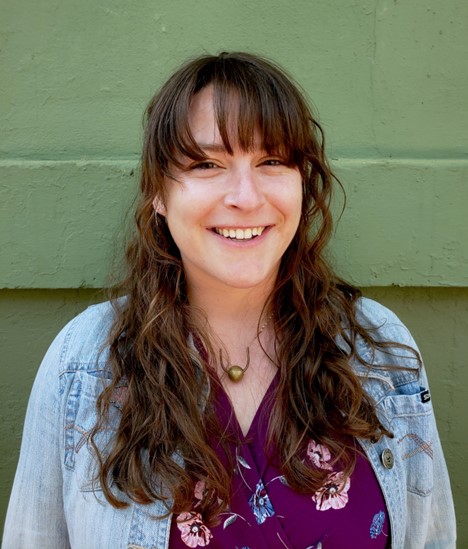Name: Amy M. Kemp
Earned Degree(s): M.A. in Communication Sciences and Disorders, B.A. in Intrapersonal Communications
Program of study/Year in program: Ph.D. Candidate in Communication Sciences and Disorders
Mentor/Advisor: Katy O’Brien
University: University of Georgia
ANCDS Fellowship Mentor: Melissa Duff
Area(s) of research, teaching, and/or clinical interest: Cognitive rehabilitation after traumatic brain injury, older adults/cognitive aging, and implementation science
1. Why were you interested in the ANCDS conference fellow program?
ANCDS is a smaller group of professionals in my field of interest (neurological communication disorders) with whom I can learn from and network with. The fellowship program offered me an opportunity to have support when I was about to enter the field as an early career professional. Dr. Duff is also an integral part of ANCDS and offered me insight into how ANCDS itself worked and what I could get involved with as part of the membership.
2. What did you enjoy about the ANCDS conference fellow program?
Dr. Duff was welcoming and supportive, especially since I didn’t know anyone else outside my immediate connections (i.e., my mentor). Furthermore, knowing there was a group of first-timers and early-career people was comforting. I didn’t feel like I was alone and could walk up to any of them and get to know their interests and background.
3. Why would you recommend the ANCDS conference fellow program to future students?
For someone interested in neurological communication disorders, this conference — and the associated guided fellowship — provides support when just beginning to network and become more independent. Future students who want to enter the field with a few connections or community opportunities are well suited to join the fellow program for that support.
4. Based on this introduction to ANCDS, what are the benefits for students, clinicians, and/or researchers?
ANCDS distinguishes itself from the larger field — particularly for SLPs — for a network of professionals interested in similar topics and areas. This group of professionals is often the people who will write letters of support for tenure indicating that networking and learning from this group can set you up for a successful and supported career. However, beyond that, as a student, making your own connections and establishing independence in your own research line is helpful to have this smaller community of experts. With just a little bravery, you can walk up to other professionals at this conference and ask about their research or other resources. This is far less intimidating than at larger conferences. Another benefit is that when I attended ASHA, I had some people I had met before and could reintroduce or continue a conversation.
5. Describe your current research and/or clinical work.
I previously practiced as an SLP for 4 years before returning to get my doctorate. I always knew that I would want to get my doctorate, especially after completing a Master’s thesis with a stellar researcher role model. I often found myself wanting effective and efficient assessment and treatment plans for my clients, who were primarily rural and may not have the opportunity for intensive rehabilitation programs. During my doctoral program, I have studied broadly to create a holistic approach to health education and rehabilitation for older adults. Combining my work in educational psychology, cognitive rehabilitation, public health, and gerontology, I became interested in preventive, informative, and therapeutic materials, particularly prevention of brain injury, that can best serve both providers and older adults. My current research accumulates these interests and gaps in healthcare to focus on self-regulation and implementation science in healthcare practice. Specifically, my main line of research examines cognitive processing and health decision-making in older adults with and without neuropathological aging. In my second line of research, I investigate implementation science to translate research into various settings (i.e., hospitals or clinics). Self-regulation interventions are particularly appropriate for cognitive aging because they focus on a better understanding of the need to select strategies and allow flexible adaptation as cognitive functions change over time.
6. Why were you interested in the above clinical or university location to expand your clinical skills?
As a clinician, I did not have enough support or evidence-based research to best support my patients. This led to a doctoral program to better understand the implementation of science frameworks and techniques for the education and practices of cognitive communication rehabilitation in older adults. The University of Georgia offered several graduate certificates and pieces of training that I could complete in order to meet this goal. Working with Dr. O’Brien, an emerging leader in cognitive communication rehabilitation, was the best-case scenario! I was excited and grateful to have this opportunity with Dr. O’Brien at the University of Georgia.

